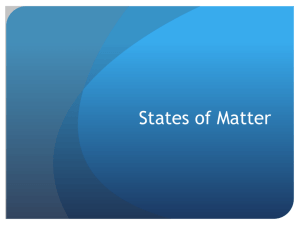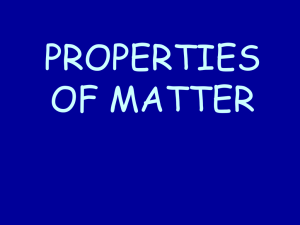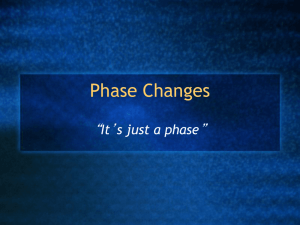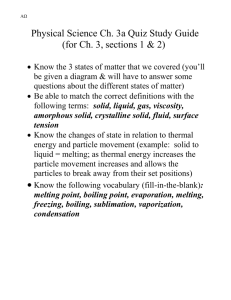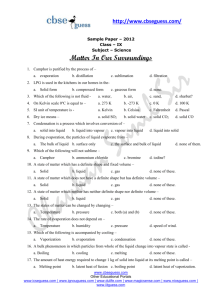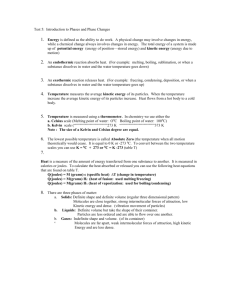What is Chemistry?
advertisement
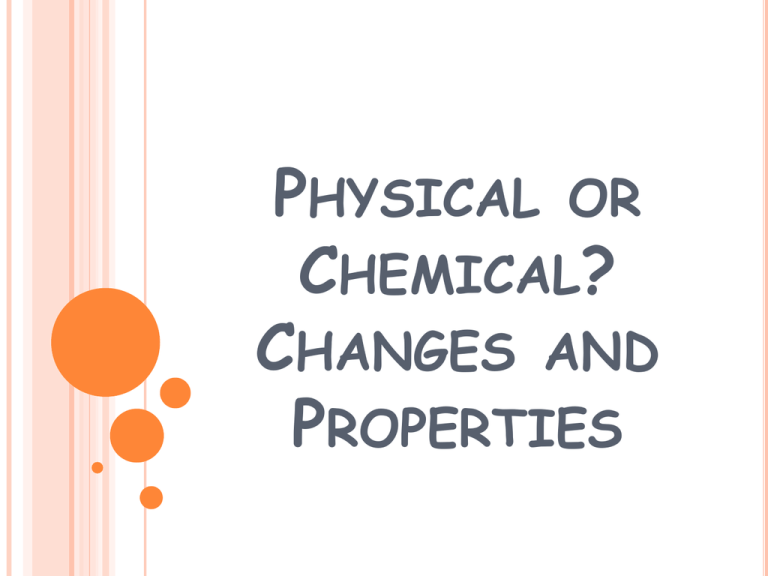
PHYSICAL OR CHEMICAL? CHANGES AND PROPERTIES WHAT IS CHEMISTRY? The study of the composition of matter and the changes that matter undergoes. WHAT IS MATTER? Anything that has mass and volume (space it occupies) All objects are made of matter It can be something that you can’t see. Examples: Air Water You! STATES OF MATTER There are three states of matter 1. Solid 2. Liquid 3. Gas SOLID Has a definite shape and volume Shape of solid does not depend on shape of container Arrangement of particles: tightly packed together LIQUID Has an indefinite shape, flows, yet has a fixed volume. Particles are close together but able to flow Takes the shape of container GAS Takes both the shape and volume of its container Gas can expand to fill any volume (unlike a liquid) Particles within a gas are far apart States of Matter SOLID (( (( (( (( (( ))(( ))(( ))(( ))(( ))(( ))(( ))(( ))(( ))(( ))(( vibrating LIQUID GAS )) )) )) )) )) moving; close together moving quickly; far apart Think-Pair-Share: Complete the state of matter summary chart in your notes. Phase (State) of matter Solid Liquid Gas Shape (s) (l) (g) Volume Spacing of Movement Particles of Particles PHASES OF MATTER Phase (State) of matter Solid Liquid Gas (s) (l) (g) Shape Volume Definite Definite Indefinite Indefinite Definite Indefinite Spacing of Particles Fixed position; very close Close but in a random arrangement Spread far apart from each other Movement of Particles Vibrating Moving: close together Moving quickly; far apart PHYSICAL VS. CHEMICAL PROPERTIES Physical Property A characteristic that can be observed or measured for a substance without a change in the identity of the substance (chemical composition does not change). Ex: color, state of matter, boiling point, melting point, density, solubility Chemical Property A characteristic that can be observed for a substance only during a change in the identity of the substance; ability of a substance to undergo a chemical change Ex: ability to rust, ability to burn, flammability, reactivity Melting point Boiling point Color State of matter Odor Taste Texture Density Electrical conductivity Solubility Adsorption to a surface Hardness Size Mass/volume Shape Flammability Explosiveness Reactivity with acid Corrosiveness Ability to Burn Ability to Rot Ability to Rust Ability to Decompose **These properties are observed as the chemical make-up of the substance is changing** DEMO: PHYSICAL OR CHEMICAL CHANGE? DEMO #1: RECORD OBSERVATIONS IS IT CHEMICAL OR PHYSICAL CHANGE? Why? DEMO #2: RECORD OBSERVATIONS IS IT CHEMICAL OR PHYSICAL CHANGE? Why? PHYSICAL VS. CHEMICAL CHANGES Physical Change A change in which Chemical Change (reaction) only the physical state or condition of a substance is involved. the particles (atoms or molecules) of a substance retain their identity. Chemical composition does not change No new products are formed Ex: dissolving, grinding, melting A change in which A new substance results (with new physical and chemical properties). the particles (atoms or molecules) of a substance become particles of a different substance Chemical composition does change Ex: burning wood, rusting PHYSICAL CHANGES All changes of state: Melting Freezing Gas becoming a liquid Deposition/Solidification Liquid becoming a gas Condensation Liquid becoming a solid Boiling/Evaporation Solid becoming a liquid Gas becoming a solid Sublimation Solid becoming a gas CHANGES OF STATE CONCEPT MAP Deposition •Freezing Milk •Dissolving sugar •Breaking a Vase •Coloring water red •Boiling Water •Ice melting •Melting Wax •Breaking a glass •Mixing sand and gravel •Cutting of Hair •Cooking •Heating Sugar •Leaves changing colors •Rusting •Burning 1. Gas Produced 2. Precipitate Formed 3. Color Change 4. Temperature Change 5. Bright Light Formed PHYSICAL VS CHEMICAL CHANGES VIDEO PARTNER PRACTICE Identify & Explain why Chemical change Physical change PART 1: MOLECULAR MODELS A) B) C) D) E) F) PART 2: STATEMENTS 1. 2. 3. 4. 5. Two elements react to produce a compound ice (H2O) melting Cl2 + H2 2 HCl a solid compound dissolving in water (H2O) Hydrogen peroxide decomposing HOW DO WE KNOW THE DIFFERENCE BETWEEN PHYSICAL AND CHEMICAL Is it an Action Word???? (-ing word) Chemical Change AND PROPERTIES????? Is it a Description???? Property Change New Substance Made CHANGES Just Looks Different Physical Change Ability to do something or -ity word Chemical Property Just describes how it looks/acts Physical Property

